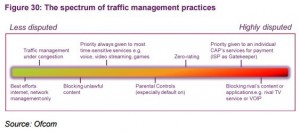When does streaming video for ‘free’ become a net neutrality issue?
The Electronic Frontier Foundation (EFF), a US-based not-for-profit organisation, have published a report claiming that T-Mobile are breaking US net neutrality rules through its Binge-On zero-rating streaming service.
Zero-rating is the practice of discounting certain data services from a user’s data cap, in this instance this means that T-Mobile customers in the US are able to watch unlimited amounts of low resolution video from partners such as Netflix and HBO. As Ofcom recently stated, there is still a debate about the desirability of these services in the realm of the Open Internet:
On one hand, they appear to be good for the consumer. 4G provides a far better streaming experience, and coupled with the trend for larger screens, the demand for data intensive video streamed to smartphones and tablets has increased. Whilst data allowances have risen, providing services outside of these caps may prove to be beneficial.
The counter-argument tends to be that, by only allowing some services outside of the cap, you go some way to creating a walled garden which content and application providers would presumably have to pay to enter. Whilst probably an issue for competition law, this may prevent the emergence of new services by discouraging users from discovering them.
In the case of T-Mobile’s Binge-On, the argument appears to be different. T-Mobile is accused by the EFF and YouTube of throttling video services regardless of whether they were enrolled in the Binge-On service. If this is the case, then it may fall foul of the Federal Communication Commission (FCC) – the US’s telecoms regulator – new rules on net neutrality which prohibit prioritisation of content. T-Mobile strongly denies that this is the case.
This will be an interesting test for industry and the FCC’s new rules which are currently being challenged in several lawsuits but the debate around zero-rating will no-doubt continue both in the US and in Europe The BSG recently conducted a review of the UK’s approach to the Open Internet and we aim to draw up a new self-regulatory Code of Practice that complies with the EU Connected Continent Regulation and which continues to preserve an Open Internet. Zero-rating will feature in these discussions, although until the extent of consumer benefits vs consumer harm is more apparent, it would appear too early – zero-rating services in the UK are in their nascent – to regulate this area.
For more on the UK’s approach to the Open Internet – https://www.connectivityuk.org/policies/bsg-openinternettrafficmanagement/







